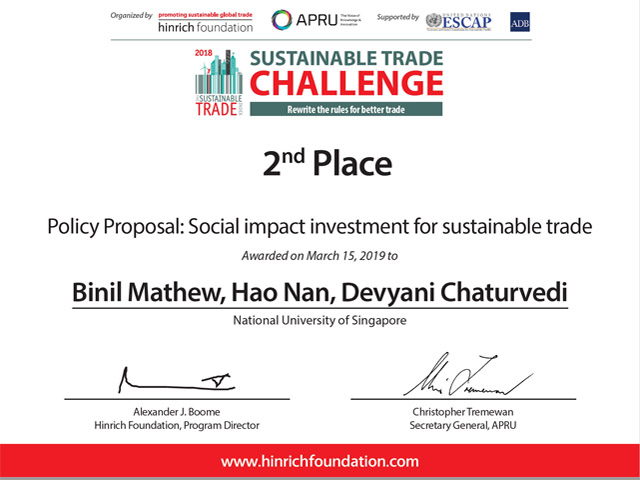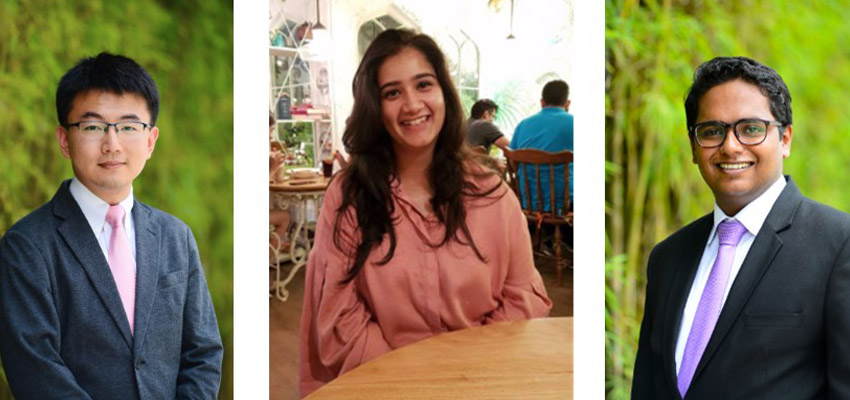[shared on behalf of Hao Nan, Devyani Chaturvedi and Binil Mathew]
It was a great learning experience participating in the Sustainable Trade Challenge 2018 organized by Hinrich Foundation and the Association for Pacific Rim Universities (APRU), and supported by United Nations ESCAP and Asian Development Bank (ADB), because the period when we worked on the project was not long after our enrolment in the school. While still learning economics and public policy at class, we were really trying to combine the in-class knowledge with the real-world challenges we had seen back in our countries and read about.
Fortunately, now it seems our exploration is on the right direction, not just because our efforts were rewarded with a prize, but also the exploration itself really deepened our understanding on the importance of trade sustainability. We believe, as pointed out by the Hinrich Foundation, trade has become a primary cornerstone for peace and prosperity in Asia-Pacific. From the public policy perspective, trade would facilitate the exchange of management experience, professionals and technologies between nations and further lead to national prosperity. From the International Relations perspective, economic inter-dependency brought by tight trade relations would lead to lasting peace.
The competition was based on Sustainable trade Index Report 2018 jointly published by Hinrich Foundation and The Economist. It required us to come up with either policy solution or industrial solution to tackle the obstacle factors identified by the report that constrain the trade sustainability in Asia-Pacific. We chose to focus on the skill gap in India, which is currently being dealt with ineffectively.
Our decision to work on India’s skill development came from an understanding that though the Indian economy has witnessed rapid trade growth in the last decade, skill gap acts as a constraint on the productivity of India’s massive young labour-force. The approach we identified to address the problem is through vocational education. As illustrated by the Hinrich Report under the Education Attainment Index, India scores 20 points, which is much lower than the average score of 38.4, though India has moved up seven places. Vocational education is particularly important, not just to bring more skilled workers back to formal and organized sector from the informal and unorganized sector they are now distributed in, but to prepare them with future-oriented skillsets, given the world is experiencing an industrial transition.
Our project proposes a Vocational Tertiary Education Model using Social Impact Investment which allows formulation of an impact-guaranteed mechanism implemented both online and offline. The Social Impact Investment mechanism brings together capital and expertise from the public, private and not-for-profit sectors to achieve a social objective through the financial leverage. Now, it has been widely recognized and applied by various leading development organizations and governments across the world. For the Vocational Tertiary Education Model, we proposed a platform composed by functions of education & training, job matching, information service, and assessment & certification. All these functions can be accessed both online and offline, given India’s personal electronic device penetration rate is not high, and workers are still used to access to services and information physically. The project also provided incentives for more jobs to be generated and diversification of the service sector in India.
While working on the proposal, the biggest obstacle for us was to literally start from scratch, to learn and try to apply the Social Impact Investment mechanism to the vocational education model we proposed. Here, we would like to specially thank the Social Impact Student Group at our school, we learned the idea and deepened the understanding from their lunchtime talks organized at the school. Also, since this proposal is actually a byproduct of a skill development model that we are still working on at the Policy Innovation Lab, an elective course we are taking, the course professors, Prof. Mancini and Prof. Ruben were very helpful and inspirational. We would like to give our sincere gratitude to them as well.
 The Team
The Team